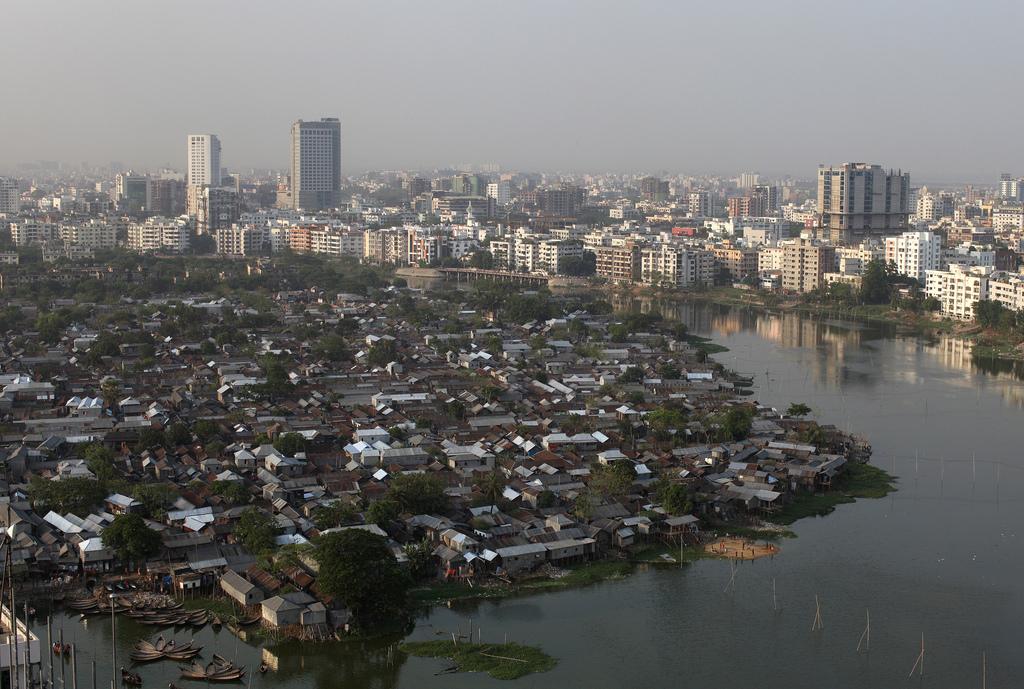Capital city of Bangladesh, Dhaka, about to access cleaner water
Adam Green

The Awani party has returned to power, in 2014, for the third time in the person of Sheikh Hasani. It is now tackling one of Bangladesh's worst endemic problem: water pollution. An international endeavor is under way to provide all Bangladeshi with clean water.
Water isn't clean in Bangladesh. Several national and international surveys have repeatedly shown that water in Bangladesh is nothing short of poisonous. The lacklustre water drainage system is barely enough to manage water in normal conditions, and is bashed beyond recognition with every rain season. All chemicals in the soil are then washed up and evacuated within the drainage system, contaminating whoever drinks it. Amongst many other deadly substances, arsenic is known to be the most widespread, and with the most irreversible effects on human health.
Fahima Binte Ahmin described the effects of the pollution for FAIR as « The dissolved oxygen level of many of the rivers’ water has reached at lethal level. … Due to over spilling of pollutants during the rainy season, the agricultural lands are contaminated that they have lost their crop growing capacity and hence remain unused all the year round .... Sometimes the pollutants enter food chain eventually killing birds, fish, and mammals. » The impact is therefore demographic, and economic.
Bangladesh is in fact only a minor producer of its own pollution. A large part of the water pollution comes from neighboring India and China, through the main rivers. Over the past decades, both major countries have undergone dramatic transformations on the demographic and economic levels, but the growth has had a dramatic toll on the environment and on water supply, which are shared on the receiving end with Bangladesh. Rumani Saikia Phukan writes, for Maps of India, « Be it Ganga, Yamuna, Brahmaputra or Kaveri or any other river flowing in the soil of our motherland, not a single river is free from pollution. River pollution has been causing serious water-borne diseases and health problems affecting human population as well as animals, fish, and birds in the environment. »
Therefore, a partnership has recently been set up with Veolia Water – the Dhaka Environmentally Sustainable Water Supply Project, DESWSP - to extract arsenic from water before it is reinjected into an upgraded, expanded and renewed water-management system. Only a few major firms in the world possess such a technology, and Veolia was chosen for its track record. Actually, the company is a longstanding partner for Bangladesh, since Veolia and Grameen Health Care Services have formed a joint venture company in 2008, namely Grameen Veolia Water Ltd, built upon social business principles. That means that the JV company, whose profits are systematically being reinvested for further expansion, follows the “no loss – no dividend model” defined by Muhammad Yunus, the famous economist who was awarded a Nobel Peace Prize for founding the Grameen Bank in 1976.
In the launching press release, Grameen Bank indicated « To fight arsenic contamination of water in Bangladesh, Veolia and Grameen Health Care Services Ltd have formed a joint venture company in 2008: Grameen Veolia Water Ltd., a company built upon on social business principles. The two companies combined their skills to deliver safe drinking water to the underprivileged inhabitants of rural Bangladesh, using state-of-the-art water treatment techniques. » The mix of national and international partners, both technical and financial, is deemed a guarantee for the project's success.
For all that, the Prime Minister Sheikh Hasina is aware that internal obstacles will have to be circumvented. Her nationalistic opposition within the country still holds a grip in the public administration, which handled water management until now. In addition, graft and corruption is rife in the country. The bodies in charge of the project want to make sure the public gets the service they deserve and need. Because Bangladesh has known, in the past, dysfunctional anomalies in its public service (although there has been much progress in recent years), the government has ensured that the right procedural safeguards were in place to implement the project.
Being a wise political fox, Sheikh Hasani has involved the European Investment bank and the Asian Development Bank. These two financial partners will not only provide financial backing for what can only be an economically straining project, it also brings an international guarantee of the proper procedure for public bidding. International banks are under strict regulations and close scrutiny.
What is about to happen in Bangladesh will be a slow, but major, shift in the economy of the Asian sub-continent. If Sheikh Hasina succeeds in pushing the project through -though with the drive she has shown until now, it seems more a matter of when than of if – Bangladesh will be on the track to overtake India and China on the level of human development.



